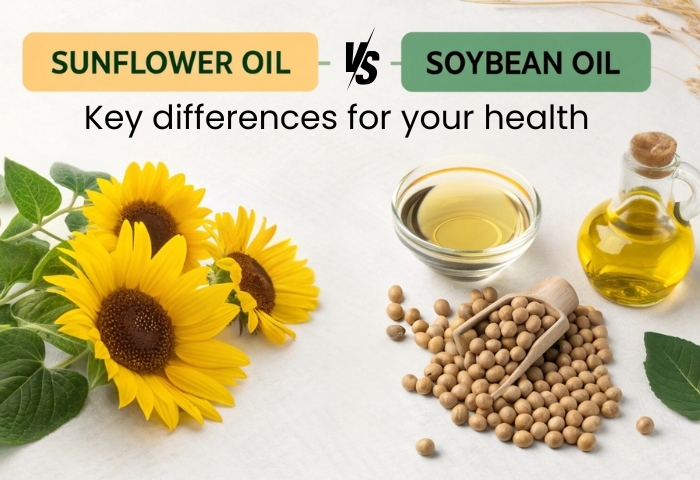Introduction
Sunflower vs. soybean oil: which oil to use for your daily cooking? although sunflower and soybean oils are the most popular choices for cooking. They are different from each other in terms of smoke points, flavors, or health benefits; both possess different qualities and, if wisely chosen, give excellent health benefits and outcomes.
Sunflower vs soybean oil: A detailed comparison
Both sunflower and soybean oils are well-known household names, but have you ever wondered why they are favorites for so many? Let’s know the differences between sunflower vs soybean oil.
Sunflower Oil: As suggested by its name, sunflower oil is derived from sunflower seeds and contains high amounts of essential fatty acids, linoleic acid (omega-6), and oleic acid (omega-9). This vegetable oil has versatile properties and health benefits and is widely used in kitchens, cosmetics, and industrial applications. The oil can be obtained either by expellers or solvent extraction methods.
- Expellers are mechanical devices that use high heat and pressure to obtain oil from raw materials, in this case, sunflower seeds.
- Solvent extraction is another widely used method for extracting oils from oil-bearing materials like soybeans, sunflower seeds, groundnuts, etc.
For both these oil extraction methods, the seeds are prepared by cleaning, dehulling, and sometimes preheating to soften them; this gives a better result for the whole oil extraction process.
Soybean Oil: This vegetable oil is derived from the seeds of the soybean plant and contains a high level of polyunsaturated fats like linoleic acid (omega-6 fatty acid). Soybean oil is highly nutritious and versatile and can be used both in culinary and industrial processes. Like sunflower oil, soybean oil can also be extracted using the method of expellers or solvent extraction.
Nutritional Comparison
Both of these vegetable oils are used in our kitchen, but have you ever wondered, sunflower vs. soybean oil, which might be the best one when it comes to our nutritional requirements? No worries, we have got you covered!
Packed with healthy fats, sunflower oil is recommended for people who have heart health issues. Sunflower oil is a great source of dietary fiber; compared to soybean oil, sunflower oil has less saturated fat but more polyunsaturated fat. It has linoleic acid, which can help lower bad cholesterol. It also has anti-inflammatory properties, which are not only good for the inside of our bodies but also for the skin.
Soybean oil, on the other hand, is rich in vitamin E and vitamin K, promoting bone health and anti-clotting properties. It has sizably more iron, zinc, and monounsaturated fatty acids. While both these vegetable oils have significant amounts of omega-6 fatty acids, soybean oil has more omega-3 fatty acids compared to the latter. A balance of Omega-3 and Omega-6 is crucial for our overall health. While omega-6 fatty acid is not that bad, consuming it more than omega-3 fatty acid can cause inflammation.
Sunflower vs soybean oil: Health Benefits
Sunflower oil has a healthier fat profile, and it is recommended for patients with cardiovascular health issues to opt for this vegetable oil. Balance is the key, so in balance, sunflower oil is a good addition. Apart from heart health benefits, sunflower oil also has several skin benefits along with potential antioxidant effects and hence is also used for cosmetic industry purposes.
Soybean oil mostly contains polyunsaturated fatty acids, which are considered heart-healthy fats because they reduce the level of LDL, which can cause major heart issues. It might also help maintain bone health as it is packed with vitamin K. Vitamin K, which is known for blood-clotting properties, might help boost bone mass.
Health Risks and Considerations
While comparing the benefits of sunflower vs. soybean oils, they both have several benefits; however, they also work on the less is more agenda. Not balancing the amount of vegetable oil we consume daily can cause several health- and heart-related issues. For instance, omega-6 fatty acids, if consumed in a higher ratio than omega-3, can cause inflammation in our body.
We should also take into consideration the ingredients, as some of them can cause severe allergic reactions. For example, some people have soy allergies and cannot consume anything that has soy in it. So it’s best to check out for allergens.
Nowadays, the quality of culinary items also depends on how they are manufactured, and vegetable oils are no different. Sunflower and soybean oil might lose some of their properties during the production process, and hence it is important to consider the nutritional value of the final product.
Sunflower vs soybean oil: Best Uses for Cooking
The best option for cooking purposes depends on what the cooking process is, as both of these vegetable oils have different smoke points. Depending on the quality, sunflower oil is a good all-purpose cooking oil and usually has a higher smoke point, making it an ideal option for deep-frying, stir-frying, grilling, and other high-heat purposes. Soybean oil is a go-to option for commercial cooking and has a medium to high smoke point. It can be used for baking, sautéing, salad dressings, sauces, frozen foods, etc.
Final words
As we have compared the nutritional values of both sunflower and soybean oil, they both have amazing nutritional values and health benefits. As per the health, taste, and industry requirements, we have been using these oils accordingly. Though there are many health benefits of both of these cooking oils, balance is the key to getting the full benefit of these liquid gold without compromising our hearts and overall health. We should also not turn a blind eye when it comes to choosing the best oil available. Taking the nutritional values into account, we should choose the best one to take full advantage of.

